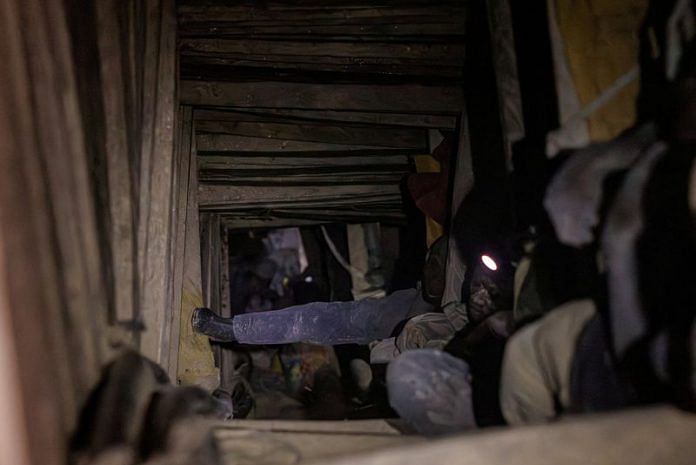By Sonia Rolley
(Reuters) -Moves to end fighting in eastern Congo that are essential to U.S. President Donald Trump’s plans for a mining bonanza in the region are meant to get underway by Sunday, but the future of a small rebel group has emerged as one of the major obstacles.
A U.S.-brokered peace agreement signed last month by the Congolese and Rwandan foreign ministers was designed to halt violence that escalated this year with a lightning advance in the Democratic Republic of Congo by M23 rebels.
Rwanda denies allegations from the U.N. and Western governments that it is fighting alongside the M23 rebels to gain access to Congo’s minerals. Rwanda says its troops are there to tackle what it describes as an existential threat from thousands of Rwandan Hutu rebels known as the Democratic Forces for the Liberation of Rwanda (FDLR).
Security experts and diplomats say the FDLR, which includes remnants of Rwanda’s former army and militias that carried out the 1994 Rwandan genocide, boasts only a few hundred combatants and is not a significant battlefield force.
But the peace agreement explicitly requires Congo to “neutralise” the FDLR as Rwanda withdraws from Congolese territory, underscoring the group’s importance to the fate of Trump’s diplomacy.
Both the Congolese operations against the FDLR and the Rwandan withdrawal are supposed to start by Sunday and conclude by the end of September.
U.N. experts said in a report this month that Rwanda, along with M23, is trying to seize control of mineral-rich territory. Kigali responded that the presence of the “genocidal” FDLR “necessitates the defence posture in our border areas”.
The U.N. experts also accused the Congolese military of relying on the FDLR in its fight against M23. A spokesperson for Congo’s government did not respond to a request for comment on that question, but Kinshasa has said it is on board with ensuring any threat posed by the FDLR is “definitively eradicated”, including by voluntary disarmament. It has also accused Rwanda of using the FDLR as a pretext for deploying on Congolese territory.
Congolese researcher Josaphat Musamba said it was not possible for Congo to rid the region of FDLR fighters given that M23 holds much of the territory where the FDLR now operates.
“It would be feasible if the Rwandan-backed rebellion were not active and threatening to conquer other territories,” said Musamba, a Ph.D. candidate at Ghent University who is from eastern Congo and studies the conflict there.
Jason Stearns, a political scientist at Simon Fraser University in Canada who specialises in Africa’s Great Lakes region, said lack of progress against the FDLR could be cited by Rwanda as a reason to keep its troops deployed in eastern Congo past September, throwing off Washington’s timeline.
“It would be fairly easy for Rwanda to claim that Congo is not abiding by its side of the deal – that its operations against the FDLR are not serious enough, have not been successful enough – and therefore to drag its feet,” Stearns said.
A spokesperson for Rwanda’s government did not respond to a request for comment on its approach to the FDLR. Rwandan President Paul Kagame said on July 4 that Rwanda was committed to implementing the deal, but that it could fail if Congo did not live up to its promises to neutralise the FDLR.
APPEAL TO TRUMP
Trump said on July 9 the Congolese and Rwandan presidents would travel to the United States in the “next couple of weeks” to sign the peace agreement. They are also expected to sign bilateral economic packages that would bring billions of dollars of investment into countries rich in tantalum, gold, cobalt, copper, lithium and other minerals. There has been no further word on a date.
While Washington has hosted negotiations between Congo and Rwanda, Qatar has hosted separate direct talks between Congo and M23. On Saturday the two sides agreed to sign a separate peace deal by August 18. M23 currently has no concrete plans to withdraw from the territory it controls.
The FDLR has urged Trump not to green-light a Congolese offensive against it.
A July 2 letter to Trump from Victor Byiringiro, the FDLR’s acting president, said attacking the FDLR would jeopardise the safety of Congolese civilians as well as more than 200,000 Rwandan refugees.
In written responses to questions from Reuters, FDLR spokesperson Cure Ngoma said only “a frank, sincere, and inclusive dialogue among Rwandans” could bring peace, though Rwanda has repeatedly ruled out such talks with the group.
Trump expects Congo and Rwanda to abide by the peace deal “which will foster lasting stability and prosperity in the region,” Anna Kelly, a White House spokesperson, said in response to Reuters questions about the FDLR’s future.
“All armed groups must lay down their arms and work within the framework of the peace process.”
The fighting has killed thousands and displaced hundreds of thousands more this year, while escalating the risk of a return to the kind of full-scale regional war which led to the deaths of millions of Congolese in 1998-2003.
(Reporting by Sonia RolleyAdditional reporting and writing by Robbie Corey-BouletEditing by Philippa Fletcher)
Disclaimer: This report is auto generated from the Reuters news service. ThePrint holds no responsibility for its content.




